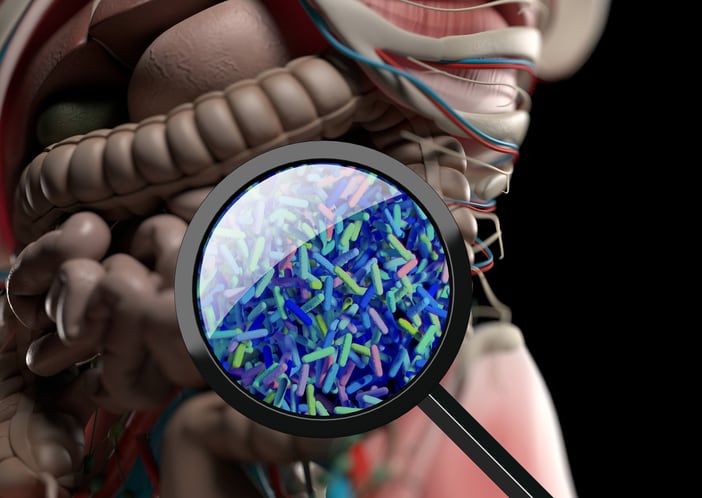Conducted by researchers at Calisia University and University of Rzeszow in Poland, the literature review explored the role of intestinal microbiota in depression and obesity and assessed the potentially benefits of supplements for these conditions.
The authors noted the importance of this research as the coexistence of obesity and depressive disorders represent a "prevalent comorbidity" in need of improved healthcare support.
Biotics in depression
There is an increasing body of evidence showing the detrimental effects of gut microbiota imbalance on mental health, which the review suggests can be addressed by modulating the microbiome.
Probiotics enhance the cytoskeletal structure, mucin secretion and tight junction protein phosphorylation in the intestinal barrier, fostering improved gut microbiota variability and bacteriocin and organic acid production.
These microbes can produce B vitamins, crucial in depression etiology, as well as decrease inflammatory cytokines and serve as SCFA sources, which play vital roles in anti-inflammatory processes.
Their action influences the secretion of neuroactive substances such as GABA, also known as gamma-aminobutyric acid, a neurotransmitter with an inhibitory effect that moderates the stress response, and serotonin.
Additionally, probiotic bacteria can affect the HPA axis (hypothalamic–pituitary–adrenal axis), which exacerbates depressive symptoms and anxiety and can increase the concentration of oxytocin in the body, reducing the activity of the HPA axis and contributing to the regulation of the stress response and reduction of anxiety.
Specifically, Lactobacillus plantarum strains 299V and PS128 have a beneficial effect on mood in depression, and Bifidobacterium infantis has a beneficial effect on regulating the HPA axis.
L. fermentum NS8 and NS9, L. gasseri OLL2809 and L. casei Shirota are a few of the strains found to directly activate neural pathways, regulate neurotrophic factors, mitigate stress, and significantly reduce depressive symptoms. Further, L. helveticus can result in a reduction in blood corticosterone levels and an increase in serotonin and norepinephrine levels.
"Encouraging findings from existing research underscore the need for robust clinical trials to evaluate the therapeutic potential of microbiota modulation, shedding light on the intricate mechanisms linking gut microbiota to mental well-being," the report stated.
Obesity interventions
Similarly, the report noted biotic interventions that have appeared as valuable tools in mitigating metabolic dysregulation among overweight or obese individuals.
The microbiota exhibits significant differences between lean and obese individuals. In overweight individuals, it is characterized by a decrease in diversity and a significant reduction in commensal bacteria characterized by anti-inflammatory effects, while pathogenic microorganisms increase. This leads to the manifestation of various metabolic pathways, which may be one of the etiological factors of obesity.
The impact of L. gasseri SBT2055 on alterations in anthropometric measurements was investigated in 43 individuals in adults with obese tendencies. Patients consumed kefir enriched with the bacterial strain for 12 weeks, and results suggested the probiotic led to reductions in body weight, BMI, waist, hip circumference and visceral fat.
Zarrati et al studied the weight management effects of L. acidophilus La5, L. casei DN001 and B. lactis Bb12 and noted a more pronounced reduction in BMI, percentage body fat and leptin levels in groups consuming the probiotic yogurt.
Sanchez et al studied the impact of L. rhamnosus CGMCC1.3724 combined with oligo-fructose and inulin supplementation on weight loss and maintenance in obese men and women over 24 weeks.
Women in the L. rhamnosus group experienced significantly greater weight loss after the first 12 weeks, associated with changes in the relative abundance of bacteria from the Lachnospiraceae family in their stools.
Multi-disciplinary approach required
The authors noted results observed in animal models may not always directly translate to humans, plus individual responses to probiotics can vary significantly, making it challenging to predict the effectiveness of probiotics universally. Therefore, there is a critical need for further research to establish the efficacy of probiotics in humans through well-designed clinical trials.
“These trials should consider various factors, such as probiotic strain specificity, dosage, duration of treatment and the target population’s characteristics,” the report stated. “Moreover, it is essential to recognize that probiotic interventions are not standalone solutions but should be considered within the context of overall dietary and lifestyle factors.”
Factors noted as potentially impacting the effectiveness of probiotics included diet quality, physical activity, stress levels and sleep patterns—underscoring the importance of personalized and multifaceted approaches in leveraging the potential of probiotics.
Source: Nutrients
doi: 10.3390/nu16071039
“The Role of Gut Microbiota, Nutrition, and Physical Activity in Depression and Obesity—Interdependent Mechanisms/Co-Occurrence”
Authors: K. Sochacka et al.


